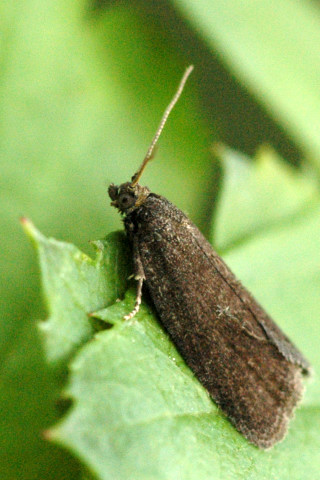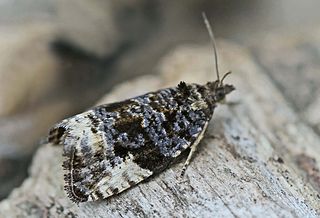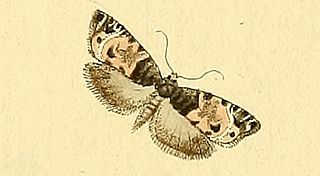Related Research Articles

Lozotaenia forsterana is a moth of the family Tortricidae. It is found in Europe and across the Palearctic.

Aphelia viburnana, the bilberry tortrix, is a moth of the family Tortricidae. It is found in Europe, from Portugal and Great Britain to the Ural Mountains, Siberia and Mongolia, further east to the Russian Far East.

Aleimma loeflingiana is a moth of the family Tortricidae. It is found in Europe and the Near East.

Enarmonia formosana, the cherrybark tortrix or cherry-bark moth, is a small but colorful moth species of the family Tortricidae. It is native to all of northern and western Europe, ranging south to the Maghreb. North of the Alps its range extends eastwards to Siberia and Kazakhstan. Possibly and most likely introduced populations are found in Asia Minor and North America, respectively.

Notocelia rosaecolana is a moth of the family Tortricidae. It is found in the Palearctic realm, where it has been recorded from China, Mongolia, Korea, Japan, Iran, Central Asia, Russia and Europe.

Archips rosana, the rose tortrix, is a moth of the family Tortricidae. It is found in both the Palearctic and Nearctic realms.

Acleris rhombana, the rhomboid tortrix, is a moth of the family Tortricidae. It is found in the Palearctic realm, from Europe to the Caucasus, Armenia, and Turkmenistan.

Celypha aurofasciana is a small moth species of the family Tortricidae. It is native to Europe and the Palearctic but occurs in some other places as an introduced species.

Hedya pruniana, the plum tortrix, is a species of moth of the family Tortricidae. It is found in the Palearctic realm. In central Europe, it is a common species. In the east, the range extends through Anatolia and Iran, the Ural, Transcaucasia and western Kazakhstan to the Far East.
Asthenoptycha heminipha is a species of moth of the family Tortricidae. It is found in Australia, where it has been recorded from Queensland.
Capua acrita is a species of moth of the family Tortricidae. It is found in Australia, where it has been recorded from Victoria.
Grapholita amphitorna is a species of moth of the family Tortricidae. It is found in Australia, where it has been recorded from Queensland.
Meritastis trissochorda is a species of moth of the family Tortricidae. It is found in Australia, where it has been recorded from New South Wales.
Melanodaedala scopulosana is a species of moth of the family Tortricidae. It is found in India, Myanmar, Thailand, Vietnam, Japan, the Solomon Islands, Papua New Guinea and Australia, where it is found along the eastern coast from New South Wales to the Cape York Peninsula in Queensland.
Epinotia absconditana is a species of moth of the family Tortricidae. It is found in Australia, where it has been recorded from New South Wales and Queensland.
Sorolopha leptochlora is a species of moth of the family Tortricidae. It is found in Australia, where it has been recorded from Queensland.

Planotortrix notophaea, the blacklegged leafroller, is a species of moth in the family Tortricidae. It is endemic to New Zealand. It was also present near Sydney in Australia, but this population is thought to be extinct.

Epinotia nemorivaga, the bearberry bell, is a species of moth in the family Tortricidae. It is found in Europe and Asia.

Eucosma aspidiscana, the golden-rod bell, is a species of moth of the family Tortricidae. It is found in China, Mongolia, Korea, Japan, Russia, North Africa and most of Europe. The habitat consists of woodlands, downland, waste grounds and cliffs.

Notocelia incarnatana, the chalk rose bell, is a species of moth of the family Tortricidae. It is found in China, Mongolia, Japan, Russia, Kazakhstan and Europe, where it has been recorded from most of the continent, except parts of the Balkan Peninsula.
References
- ↑ New Australian Lepidoptera of the Family Tortricidae
 This article incorporates text from this source, which is in the public domain .
This article incorporates text from this source, which is in the public domain .